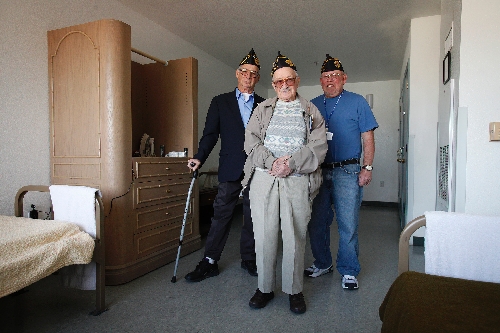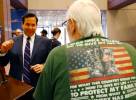Programs help homeless veterans get shelter, direction
Veterans Affairs Secretary Eric Shinseki's goal is to eliminate homelessness among veterans by 2015.
If he succeeds in Las Vegas, he should thank Abe Efros of Jewish War Veterans Post 64, Dennis Larson of the Key Foundation and several other veterans groups and community shelters that chip in to get homeless vets back on their feet.
Without their help, government programs probably would fail. And, for what it costs the VA in hundreds of millions of dollars to attack the problem on a national scale, they're doing it in Las Vegas and Clark County for tens of thousands of dollars.
"We started with one room at the Salvation Army and then worked our way up to three rooms," Efros said Tuesday.
"For about a week around Memorial Day and Veterans Day, we go out trying to raise money through our poppy drives," he said, adding that they also receive money from donors to pay $2,100 per month for the rooms and living expenses.
In its 10th year, Post 64's foundation has gotten 1,800 homeless vets off the street by partnering with the Salvation Army and the VA's Community Based Outreach Clinic/Health Care for Homeless Veterans.
Homeless veterans who seek help are first screened by the outreach clinic to confirm their service and honorable discharge and to meet health requirements such as getting shots for tuberculosis, a contagious lung disease.
Gregory Abernathy, the VA outreach coordinator, said veterans who are referred to the program or who contact a hot line are given a psycho-social assessment to determine their needs and ambitions for getting off the street and finding employment.
Then, if they are recommended for help from Post 64's Ed Kline Memorial Foundation -- named for Efros' associate who died last year -- the post's program pays for their room and board for 10 days while they look for work.
The post rents rooms with three beds each at the Salvation Army, where the vets stay while living in Spartan conditions.
"Some go home. Some get a job. We have a ratio of 85 percent that don't return back to homelessness," said Efros, a World War II Navy veteran, who served on the USS Levy in the South Pacific.
He said the reason for limiting their stay to 10 days is because "there are too many homeless veterans out there. This is to give them a fresh start."
ASSESSING THE PROBLEM
According to a large-scale homeless census conducted in January 2011, there are 1,350 homeless veterans on any given night in Clark County. That is down from 2,262 in 2009, a 40 percent decrease.
Homeless vets account for a sizeable fraction of the overall homeless population that regional officials said was 9,432 last year, down from 13,338 in 2009, a 30 percent decrease.
The number of unsheltered "street" homeless, however, increased from 3,027 in 2009 to 4,241 in 2011.
Larson, president of the Key Foundation -- a nonprofit organization specifically for veterans -- believes from his hands-on experience that there are more homeless veterans than the estimated 1,350 that turned up in last year's census.
"Close to 3,000 to 4,000 is really what it is," he said Friday, noting that the census estimate doesn't count homeless veterans living in transitional housing, shelters and other projects and those who are living beyond the fringe of the homeless corridor along Las Vegas Boulevard near Washington and A streets.
In the past 20 years, Larson said the Key Foundation has helped take 10,000 homeless vets off the streets.
With $10,000 to $15,000 per year from city and county funds, the foundation helps homeless veterans find work by sending faxes and emails to potential employers and providing bus passes for job interviews.
The foundation thrives on donations in the form of cash, boats, motors and cars, which are repaired and sold.
The organization's crown jewel is its transitional housing program, which takes veterans off the streets and places them in one of three houses maintained by the foundation.
The houses, at various locations in the Las Vegas Valley, were bought in 1994 with a $350,000 grant from the VA. They are shared by homeless vets who don't have a disability pension or similar support program. The program is designed to give them a place to live until they find employment and save enough money to make it on their own.
FEDERAL HELP
Shinseki, the VA secretary, launched a program last year to give 40 states, including Nevada, a combined $41.9 million for grants and community groups to provide 2,568 beds for homeless vets.
The program is part of Shinseki's strategy to reduce the number of homeless vets on a typical night by 18 percent, down to 107,000 veterans this year, and continue the pace for four more years.
While the effort gives hope for homeless vets, a report this week by the Government Accountability Office shows the number of homeless female veterans has more than doubled, from 1,380 in 2006 to 3,328 in 2010.
According to Sen. Patty Murray, D-Wash., who leads the Senate Veterans Affairs Committee, the GAO report found that the VA has limited data on the number and needs of homeless women veterans, who are not always aware of the services available to them.
"While we have seen a decrease in the overall number of homeless veterans, the number of needs of homeless women veterans across the country are growing and the VA is struggling to keep up," Murray said in a news release.
In his State of the Union speech Tuesday, President Barack Obama was applauded for noting that VA spending has increased "every year I've been president," while many budgets of other federal agencies have been slashed during the lingering economic recession.
"As they come home, we must serve them as well as they've served us. That includes giving them the care and the benefits they have earned ... and it means enlisting our veterans in the work of rebuilding our nation," Obama said.
The VA's budget increased from $99.8 billion to $115 billion in 2010 and grew to $126.6 billion last year.
This year, Obama requested $132.2 billion for the VA, of which $51.2 billion was approved Dec. 23 for the Veterans Health Administration, the branch of the VA that provides primary care and related medical and social support services including programs for homeless veterans.
The Obama administration has spent more on the VA to stem the rising tide of costs associated with health care, traumatic brain injuries and post-traumatic stress disorder from post-9/11 veterans.
At the same time, the VA is still dealing with a backlog of cases from veterans of the Vietnam War and Persian Gulf War, and a dwindling but significant number from the Korean War and World War II.
According to Larson, of the Key Foundation, the bulk of the homeless veterans' population is in the 50-plus age category.
"And, right now, every program they've announced is for post-9/11 veterans. They're a bunch of fat bureaucrats getting big pay checks, and they're not doing a damn thing. That's where your millions are going," said Larson, a 68-year-old Vietnam-era veteran.
Review-Journal reporter Lynnette Curtis contributed to this report. Contact reporter Keith Rogers at krogers@ reviewjournal.com or 702-383-0308.
HOMELESS HELP
To help homeless veterans through donations and find out about some of the programs available for them contact the following:
Jewish War Veterans Post 64 at (702) 362-5995.
The Key Foundation at (702) 384-0202 from 8 a.m. until noon Monday through Friday.
Veterans Affairs Community Based Outreach Clinic/Health Care for Homeless Veterans at (877) 424-3838.




























